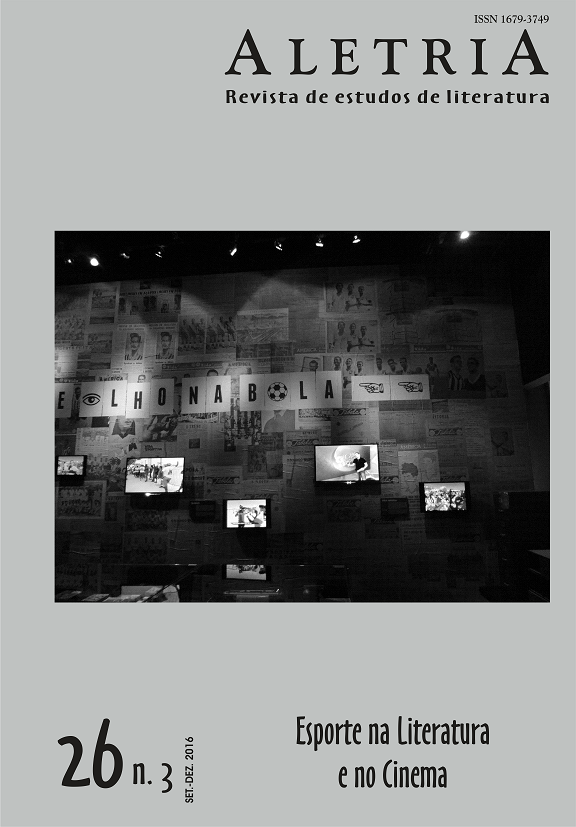The Borderlands Between Literature and Football: Constructing a Provisional Identity in Aldyr Garcia Schlee’s Short Story “Empate”
DOI:
https://doi.org/10.17851/2317-2096.26.3.49-68Keywords:
border, culture, literature, footballAbstract
This essay views borders as culturally autonomous places with peculiar identity roots. It also highlights the theme of belonging, in which the similarity between Jaguarão and Rio Branco – border cities between Brazil and Uruguay – is greater than between the former and the nearest metropolis. Based on this principle this work analyzes the short story “Empate” (“The draw”), published in the Contos de futebol (Football short stories), by Aldyr Garcia Schlee. The book consists of eleven short stories – alluding to the number of players in a football team – and was originally published in Uruguay, under the title Cuentos de fútbol, and later translated into Portuguese by the author himself for the Brazilian edition. Both its analysis and interpretation are supported by the relationship between literature and society, based on Antonio Candido’s studies, as well as on reflections about football and the imagery that permeates the borderlands of cultural identity.
Downloads
References
ABDALA JÚNIOR, Benjamin. Poder simbólico e comunitarismos: fluxos ibero-afro-americanos. In: JOBIM, José Luís et al. (Org.). Sentidos dos lugares. Rio de Janeiro: ABRALIC, 2005. p. 97-118.
CANDIDO, Antonio. Literatura e sociedade. São Paulo: Publifolha, 2000.
COSTA, José; JACÓ, Victor. Hino do Grêmio Esportivo Brasil. [c1956]. Disponível em: http://www.gebrasil.com.br/hino/. Acesso em: 18 fev. 2010.
DICIONÁRIO eletrônico Houaiss da língua portuguesa. Rio de janeiro: Objetiva, 2005. 1 CD-ROM.
DORFMAN, Adriana. A cultura do contrabando e a fronteira como um lugar de memória. Revista Digital Estudios Históricos, n. 1, p. 1-10, 2009. Disponível em: http://dialnet.unirioja.es/servlet/articulo?codigo=3010815. Acesso em: 15 mar. 2010.
JOZEF, Bella. O lugar da América. In: JOBIM, José Luís et al. (Org.). Sentidos dos lugares. Rio de Janeiro: ABRALIC, 2005. p. 117-131.
LOTECA – Como jogar. [s.d.]. Disponível em: http://www1.caixa.gov.br/loterias/loterias/loteca/como_jogar.asp. Acesso em: 22 dez. 2008.
MASINA, Léa. Alcides Maya, Cyro Martins e Sérgio Faraco: tradição e representações do regional na literatura gaúcha de fronteiras. In: CHIAPPINI, Ligia; MARTINS, Maria Helena; PESAVENTO, Sandra Jatahy. (Org.). Pampa e cultura: de Fierro a Neto. Porto Alegre: UFRGS, Instituto Estadual do Livro, 2004. p. 95-121.
SANTOS, Pedro Brum. Ficção e futebol: culturas em movimento. Letras, Santa Maria, UFSM/CAL, n. 18-19, p. 139-152, 1999.
SCHLEE, Aldyr Garcia. Contos de futebol. Porto Alegre: Mercado Aberto, 1997.
SCHLEE, Aldyr Garcia. Prefácio. In: JÚNIOR, Nauro; CECCONI, Eduardo. A noite que não acabou. Pelotas: Livraria Mundial, 2009.
SOUSA, Celeste H. M. Ribeiro de. Do cá e do lá: introdução à imagologia. São Paulo: FAPESP, 2004.
TORRES, Lilian de Lucca. A construção da identidade segundo a antropologia. Leituras da História, São Paulo, Escala, v. 20, p. 60-61, maio 2009.
Downloads
Additional Files
Published
How to Cite
Issue
Section
License
Copyright (c) 2017 João Luis Pereira Ourique, Alexandre Antonio Ramos Maciel (Autor)

This work is licensed under a Creative Commons Attribution 4.0 International License.
Authors who publish with this journal agree to the following terms:Authors retain copyright and grant the journal right of first publication with the work simultaneously licensed under a Creative Commons Attribution Non-Commercial No Derivatives License that allows others to share the work with an acknowledgement of the work's authorship and initial publication in this journal.Authors are able to enter into separate, additional contractual arrangements for the non-exclusive distribution of the journal's published version of the work (e.g., post it to an institutional repository or publish it in a book), with an acknowledgement of its initial publication in this journal.Authors are permitted and encouraged to post their work online (e.g., in institutional repositories or on their website) prior to and during the submission process, as it can lead to productive exchanges, as well as earlier and greater citation of published work (See The Effect of Open Access).





